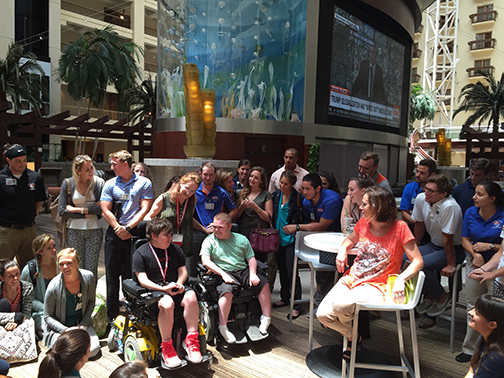DPT students gain new insights on research, patient experience at unique muscular dystrophy conference
In the gene therapy technique CRISPR-Cas9, researchers can target and snip out specific mutations in a genome, potentially eliminating mutations that cause genetic disease.
Science magazine called CRISPR-Cas9 technology 2015’s Breakthrough of the Year and it has shown promise for treating Duchenne muscular dystrophy in animal studies. UF Doctor of Physical Therapy students in the Pediatrics in Physical Therapy course heard an update on the research from Eric Olson, Ph.D., one of the leading scientists in the use of CRISPR-Cas9 for Duchenne, when they attended the 2016 Parent Project Muscular Dystrophy (PPMD) Connect conference held this summer in Orlando.
The PPMD conference is unusual in that it brings together scientists, parents and Food and Drug Administration representatives to discuss advances in Duchenne therapies, said the students’ instructor Claudia Senesac, Ph.D., P.T., a clinical associate professor in the department of physical therapy.
Senesac often invites pediatric patients and parents into her classroom, but the PPMD annual conference, which is held in a different U.S. location every year, was an opportunity to show her students a broader view of how scientists and families contribute to new treatment development.
“Our students never would have been able to experience this in the classroom,” she said. “They were able to hear how animal research translates to human research, then to clinical trials and eventually to the FDA who decides if a drug will be approved. Not only does this experience give students an idea of the process, it also shows them the grassroots of how parents are involved.”
Duchenne muscular dystrophy, a disease that affects boys, causes the muscles that control movement to progressively weaken and lose the ability to regenerate, eventually replacing muscle tissue with fat and scar tissue. Because of muscle loss, many patients need a wheelchair by age 12. Several researchers at UF, including PHHP’s Krista Vandenborne, Ph.D., P.T., a professor and chair of the department of physical therapy, are working to understand the muscle degeneration caused by the disease and contribute to therapeutic development.
At the PPMD Connect conference, the UF DPT students heard presentations on emerging research and the development of robotic technologies to enhance function in tasks of everyday living.

“I think the most valuable lesson I learned during this conference is that every patient is unique and complex,” said Cassandra McGowan, a DPT student in Senesac’s class. “Ultimately we are working toward enhancing our patients’ quality of life and striving to increase their independence. We must remain sensitive, considerate and flexible with our treatments and relationships as we learn more about their challenges and goals.”
Clinical trials offer Duchenne families and providers a great deal of hope, but participating in these studies requires a lot of effort on the part of the families, as DPT student Michael Broderick learned from a panel discussion of parents and boys who have participated in clinical trials.
“It takes so much selflessness and sacrifice as they give back for research that may not affect their own outcomes, but might benefit kids who aren’t alive yet today,” Broderick said.
Senesac also arranged for her class to talk with two teenagers who have Duchenne. The students could ask the boys anything.
Dylan Miceli-Nelson, 15, a Duchenne advocate whose work has been featured in People magazine, talked with the DPT students about his own physical therapy treatment and assistive equipment and his work raising Duchenne awareness through his YouTube and Instagram channels, which have garnered millions of views.
“I hope the PT students take away that this is a pretty serious disease and they are a big part of helping it,” Miceli-Nelson said.
Talking with the teens was a highlight of the conference for student Danielle Frain.
“We gain knowledge in the classroom, but as physical therapists we need to take that knowledge and apply it to real people,” she said. “Being at the conference really helped me understand more about how people with Duchenne are living with the disease.”

